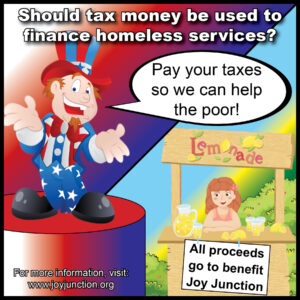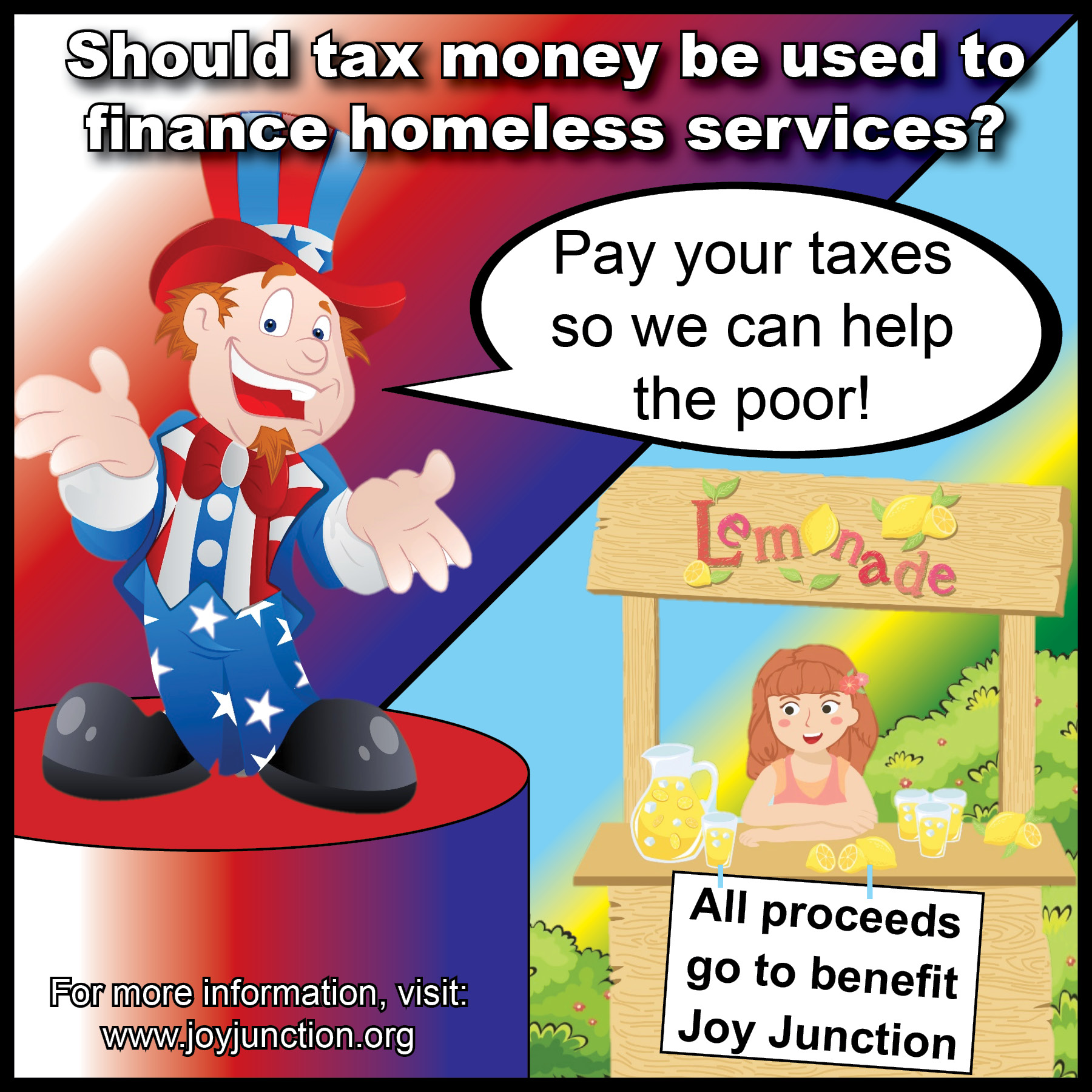By Jeremy Reynalds, Ph. D.
Founder and CEO
Joy Junction Inc.
 It was once the case but no more. The church and faith based organizations taking the lead role in helping alleviate the plight of the homeless and hungry.
It was once the case but no more. The church and faith based organizations taking the lead role in helping alleviate the plight of the homeless and hungry.
If that was ever to happen again, it could free up hundreds of millions of dollars of tax money for other essential services. But tragically, with some Christian writers calling those trapped in poverty “scammers” and “sluggardly,” I can’t see it occurring any time soon.
So while thousands of Christian organizations with funds provided by generous supporters do amazing works of compassion each day, what precipitated the change to such massive government involvement? Time for a little historical context.
Marvin Olasky addressed this issue in his well documented but highly controversial book “The Tragedy of American Compassion.”
A review of the book says, “The early American concept of charity, as expressed from both pulpit and printed page, stressed biblical themes. This established the cultural and intellectual framework for viewing the problem for at least the next 250 years.”
Quoting from Olasky, reviewer Daniel Bazikian goes on to say that “Emphasis on a God of justice and mercy, and of man as a fallen, sinful creature, led people ‘to an understanding of compassion that was hard-headed but warm-hearted.’”
Olasky said that changing ways of thinking and the onset of the Great Depression of the 1930s resulted in the private system of charity being stretched beyond its limit, and as a result President Franklin D. Roosevelt’s New Deal was born, and the results (whatever you think of them) have been around ever since.
Helping those in need is expensive. According to the United States Interagency Council on Homelessness, in his 2016 budget President Obama called for nearly $5.5 billion in targeted homelessness assistance. That’s a lot of money.
And while it’s hard to estimate the dollar amount spent by private charities on the homeless, it’s a vast amount and a lot of help. To name just a few, there’s Catholic Charities , the 300 members of the Association of Gospel Rescue Missions and the Salvation Army which operates 7,546 centers in communities across the United States.
Sadly, all that help isn’t apparently reducing the number of homeless as quickly as originally hoped.
A report from the Department of Housing and Urban Development said there are still more than 500,000 people homeless in the U.S. The real figure is almost certainly way higher.
But why are we still seeing such huge government involvement in assistance to the hungry, homeless and more? It’s much more than the problem being too big for religious groups and charities to address it without federal, state and city assistance.
Perhaps it’s at least in part because of attitudes like this.
Summarizing Olasky, Bazikian says, “Those in genuine need would be helped, but those who were slothful were allowed to suffer until they showed a willingness to change.”
It is what I have come to think of as bumper sticker theology or thinking. It sounds good (to some) in practice, but in reality doesn’t work and is not kind or biblical.
Think about the end result of what Olasky seems to be saying (at least back then when the book was published).
If someone is lazy and doesn’t “want” to work, then let them starve until they come to their senses. Is that what occurred back then? I hope not. And if so, who sets the parameters for being lazy or slothful, and who decides how long you can be that way until you enjoy your last free burger? And is it what Jesus would do? I think not.
In his book “In the Shadow of Plenty,” author George Grant (sadly) writes, “There is a clear distinction then between the oppressed and the sluggardly. The oppressed would work only if they could. The sluggardly could work, if only they would.”
Grant continues by saying that subsidizing sluggards is the same as subsidizing evil. While the book is 30 years old, this sort of thinking continues in books like Robert Lupton’s 2012 “Toxic Charity.”
One reviewer of his book writes, “Lupton moves uncritically between uplifting the capacity and creativity of the poor and degrading them as lazy and dishonest. ‘Most (panhandlers) are scammers,’ he states (45). Most poor people in the United States ‘assume that their subsistence is guaranteed’ and so lack any kind of work ethic, he claims.” (121).
Tragically, people who hold to the sort of thinking propagated by Grant and Lupton make no allowance for mental health issues. Maybe someone doesn’t “want” to work, because they are unable to do so. Perhaps they suffer from bipolar disorder, depression, PTSD and the usually unseen struggles that can result from rape or abuse.
I’ve often heard it said that the most debilitating illnesses are the ones you can’t see. It’s also a statement with which I agree.
Some complain that the government rocks the human soul from cradle to grave, but as a former Speaker of the House once told us at a meeting I attended many years ago here in Albuquerque, commensurate with the government doing less is the private sector doing more.
It’s also a fact that if we as Christians want to have a “seat at the table” and be regarded as relevant to our rapidly changing culture, we need to disassociate ourselves with the rhetoric I’ve quoted above, and demonstrate the unconditional love of Jesus in word and deed every opportunity we can.
Oh, and the question I posed as the title for this piece as to whether the government should finance homeless services? Probably not, but we will really have to change the way we proclaim the “good news” before anyone even thinks of us as being a remote contender to solve our nation’s hunger, homeless and social welfare woes.
But even while you’re thinking about these issues, we have new opportunities every day to make a difference in the life of one person at a time. Let’s take advantage of them.


